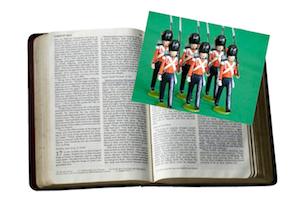 I want to pause this discussion for a while. All of the good comments have left me with lots to think about, and I want to work through some of this in my mind before proceeding. More than once I’ve been accused of beginning a series like this with my mind made up, with my final conclusions preset. That’s just not true.
I want to pause this discussion for a while. All of the good comments have left me with lots to think about, and I want to work through some of this in my mind before proceeding. More than once I’ve been accused of beginning a series like this with my mind made up, with my final conclusions preset. That’s just not true.
I want to leave you for now with one big question: how do we deal with the Old Testament passages on worship?
The traditional argument I always heard was that the Old Testament was nailed to the cross and has nothing to do with the practices of the New Testament church. Or as Thomas Campbell eloquently put it in his Declaration and Address:
That although the scriptures of the Old and New Testament are inseparably connected, making together but one perfect and entire revelation of the Divine will, for the edification and salvation of the church; and therefore in that respect cannot be separated; yet as to what directly and properly belongs to their immediate object, the New Testament is as perfect a constitution for the worship, discipline and government of the New Testament church, and as perfect a rule for the particular duties of its members; as the Old Testament was for the worship discipline and government of the Old Testament church, and the particular duties of its members.
Others say that the Old Testament moral law is still in effect, but all of the ceremonial law was abolished.
Another view is that the Old Testament shows us what is pleasing to God; unless a practice is specifically said to be discontinued, it should be a part of our worship.
And there’s a multitude of nuances from there.
What’s your view? In what ways should worship in the Hebrew Scriptures inform the worship of the church?


